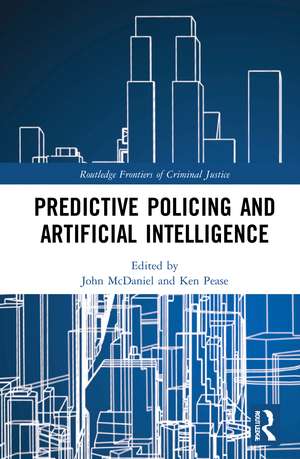Predictive Policing and Artificial Intelligence: Routledge Frontiers of Criminal Justice
Editat de John McDaniel, Ken Peaseen Limba Engleză Paperback – 29 aug 2022
AI promises to reduce unnecessary labour, speed up various forms of police work, encourage police forces to more efficiently apportion their resources, and enable police officers to prevent crime and protect people from a variety of future harms. However, the promises of predictive and AI technologies and innovations do not always match reality. They often have significant weaknesses, come at a considerable cost and require challenging trade- off s to be made. Focusing on the UK, the US and Australia, this book explores themes of choice architecture, decision- making, human rights, accountability and the rule of law, as well as future uses of AI and predictive technologies in various policing contexts. The text contributes to ongoing debates on the benefits and biases of predictive algorithms, big data sets, machine learning systems, and broader policing strategies and challenges.
Written in a clear and direct style, this book will appeal to students and scholars of policing, criminology, crime science, sociology, computer science, cognitive psychology and all those interested in the emergence of AI as a feature of contemporary policing.
| Toate formatele și edițiile | Preț | Express |
|---|---|---|
| Paperback (1) | 313.08 lei 3-5 săpt. | +28.69 lei 6-12 zile |
| Taylor & Francis – 29 aug 2022 | 313.08 lei 3-5 săpt. | +28.69 lei 6-12 zile |
| Hardback (1) | 1014.50 lei 6-8 săpt. | |
| Taylor & Francis – 26 feb 2021 | 1014.50 lei 6-8 săpt. |
Din seria Routledge Frontiers of Criminal Justice
-
 Preț: 303.17 lei
Preț: 303.17 lei -
 Preț: 289.87 lei
Preț: 289.87 lei -
 Preț: 311.06 lei
Preț: 311.06 lei -
 Preț: 301.55 lei
Preț: 301.55 lei -
 Preț: 349.88 lei
Preț: 349.88 lei -
 Preț: 309.55 lei
Preț: 309.55 lei -
 Preț: 310.12 lei
Preț: 310.12 lei -
 Preț: 152.72 lei
Preț: 152.72 lei -
 Preț: 279.99 lei
Preț: 279.99 lei -
 Preț: 311.85 lei
Preț: 311.85 lei -
 Preț: 287.90 lei
Preț: 287.90 lei -
 Preț: 283.04 lei
Preț: 283.04 lei - 8%
 Preț: 388.78 lei
Preț: 388.78 lei -
 Preț: 312.54 lei
Preț: 312.54 lei -
 Preț: 323.91 lei
Preț: 323.91 lei -
 Preț: 151.97 lei
Preț: 151.97 lei -
 Preț: 326.49 lei
Preț: 326.49 lei -
 Preț: 325.45 lei
Preț: 325.45 lei - 8%
 Preț: 389.01 lei
Preț: 389.01 lei - 9%
 Preț: 865.42 lei
Preț: 865.42 lei -
 Preț: 250.40 lei
Preț: 250.40 lei -
 Preț: 341.57 lei
Preț: 341.57 lei - 18%
 Preț: 1057.89 lei
Preț: 1057.89 lei - 18%
 Preț: 1053.64 lei
Preț: 1053.64 lei - 18%
 Preț: 1172.23 lei
Preț: 1172.23 lei -
 Preț: 390.54 lei
Preț: 390.54 lei -
 Preț: 491.26 lei
Preț: 491.26 lei - 18%
 Preț: 1106.81 lei
Preț: 1106.81 lei - 18%
 Preț: 1170.74 lei
Preț: 1170.74 lei - 18%
 Preț: 1057.75 lei
Preț: 1057.75 lei -
 Preț: 276.68 lei
Preț: 276.68 lei -
 Preț: 401.54 lei
Preț: 401.54 lei - 13%
 Preț: 310.05 lei
Preț: 310.05 lei - 28%
 Preț: 819.25 lei
Preț: 819.25 lei -
 Preț: 463.62 lei
Preț: 463.62 lei - 18%
 Preț: 1000.13 lei
Preț: 1000.13 lei - 18%
 Preț: 1007.72 lei
Preț: 1007.72 lei - 18%
 Preț: 1170.74 lei
Preț: 1170.74 lei - 18%
 Preț: 997.90 lei
Preț: 997.90 lei - 18%
 Preț: 1111.58 lei
Preț: 1111.58 lei - 18%
 Preț: 1175.72 lei
Preț: 1175.72 lei - 18%
 Preț: 1109.99 lei
Preț: 1109.99 lei -
 Preț: 354.21 lei
Preț: 354.21 lei - 18%
 Preț: 1107.61 lei
Preț: 1107.61 lei
Preț: 313.08 lei
Nou
Puncte Express: 470
Preț estimativ în valută:
59.91€ • 62.88$ • 49.72£
59.91€ • 62.88$ • 49.72£
Carte disponibilă
Livrare economică 21 martie-04 aprilie
Livrare express 06-12 martie pentru 38.68 lei
Preluare comenzi: 021 569.72.76
Specificații
ISBN-13: 9780367701369
ISBN-10: 0367701367
Pagini: 330
Ilustrații: 6
Dimensiuni: 156 x 234 x 21 mm
Greutate: 0.61 kg
Ediția:1
Editura: Taylor & Francis
Colecția Routledge
Seria Routledge Frontiers of Criminal Justice
Locul publicării:Oxford, United Kingdom
ISBN-10: 0367701367
Pagini: 330
Ilustrații: 6
Dimensiuni: 156 x 234 x 21 mm
Greutate: 0.61 kg
Ediția:1
Editura: Taylor & Francis
Colecția Routledge
Seria Routledge Frontiers of Criminal Justice
Locul publicării:Oxford, United Kingdom
Public țintă
Postgraduate and UndergraduateCuprins
Introduction 1.The Future of AI in Policing: Exploring the sociotechnical imaginaries Part One: Bias and Big Data 2.Predictive Policing through Risk Assessment 3.Policing, AI and Choice Architecture 4.What Big Data in Health Care Can Teach Us About Predictive Policing 5.Artificial Intelligence and Online Extremism: Challenges and Opportunities 6.Predictive Policing and Criminal Law Part Two: Police Accountability and Human Rights 7.Accountability and indeterminacy in predictive policing 8.Machine learning predictive algorithms and the policing of future crimes: governance and oversight 9.'Algorithmic impropriety' in UK policing contexts: A developing narrative? 10.Big Data Policing: Governing the Machines? 11.Decision-Making: Using technology to enhance learning in police officers Conclusion
Notă biografică
John L.M. McDaniel teaches and researches within the University of Wolverhampton Department of Social Science, Inclusion and Public Protection and is an active member of the University’s Law Research Centre. He focuses on issues of police accountability, corruption, human rights, and international cooperation and security.
Ken G. Pease is a Professor in Policing at the University of Derby. He has written numerous books on policing, psychology and crime science.
Ken G. Pease is a Professor in Policing at the University of Derby. He has written numerous books on policing, psychology and crime science.
Descriere
This edited text draws together the insights of numerous worldwide eminent academics to evaluate the condition of predictive policing and artificial intelligence (AI) as interlocked policy areas; it explores themes of decision making, human rights and rule of law, as well as considering the future of the use of AI in policing.
